Waste Treatment and Recycle in Nigeria
DAUDA Sada Abba, CAO Jian, LÜ Xiang-yu
(1.University of Maiduguri,Maiduguri 1069,Nigeria;2.Shenyang University of Chemical Technology,Shenyang 110142,China;3.Productivity Promotion Centers of Liaoning,Shenyang 110179,China)
Nigeria is the most populous nation in Africa with 36 states and total number of 174 507 509 people.It is located in western part of Africa,bordering Niger republic,Cameroon,Benin republic and Chad republic[1].It has total area of 910 771 square km of landmass and it has density of about 188.9 km/person.Its GDP according to 2013 world bank estimate is$485 194 billion[2].It has enormous natural resources which makes it the giant of Africa.
With increase in population and technology which led to urbanization,industrialization and globalization,the challenge of solid waste management in the Country has increased and even now complex.Contributory factors to the challenge include inadequate regulatory framework that has manifested in lack of interest of private sector investment in service delivery(infrastructure);uncoordinated institutional functions;low capacity to discharges duties,poor data information for planning,and wrong attitude of waste dumping in undesirable locations among people[3].
1 Classification of Waste and Determination of Quantity of Components
For the classification of waste,ten waste components were considered.These were food/petruscible,vegetables,paper,plastic,glass/ceramic,fabrics, wood, metal, electronic waste and“others”[4-11].Others represent solid waste that are not identifiable or do not fall into the first nine categories.Sorting and weighing ofcollected waste were done at the dump site.The weight measurements were done using portable electronic scales.
2 Determination of Bulk Density
For determination of bulk density of the uncompacted waste,a wooden container of capacity V1=0.1 m3was used and its mass was determined as m1.Wastecollected from households was poured into the container until it was overflowing.The contents of the container were settled by dropping it three times from a height of 10 cm;and again more waste was added to fill it(EPA,Ireland,1996).The procedure was repeated until the container was completely full.When the waste was not enough to completely fill the container,the volume V2was calculated.No pressure was applied to the waste in the container to avoid altering the bulk density.The filed container and its contents were weighed to obtain a mass m2.The bulk density(kg/m3)was calculated as follows:

The procedure was repeated daily,starting with confirmation of weight of the wooden container.
3 Relevant Agencies for Waste Treatment
Many agencies were established by some States and Federal Government to look at how waste is generated and treated at the States and Federal level[12].Such agencies include:Kano State Refuse Management and Sanitation Board(REMASAB)2003.Lagos Waste Management Authority(LAWMA)1991.Abuja Environmental Protection Board(AEPB)1989.Plateau State Environmental Sanitation Board 1999.Kano State Refuse Management and Sanitation Board(REMASAB)can be sited as an example on how waste is collected,monitored,and treated in the city.
Further analysis of waste reveal that the waste in Kano metropolis can be categorized in to two types:namely,the rather light and predominantly non-biodegradable waste in the G.R.A.and the heavier biodegradable waste in the city and the suburban zones.The Fig.1 shows the percentage of the different items of waste in the three zones.

Fig.1 Percentage waste bulk collected in the zones
Biodegradable wastes accounts for 68.26%of the average weight of the entire waste samples,while the non-biodegradable had 31.74%,showing clearly the predominant waste in Kano metropolis is biodegradable.However,marked variations exist among the zones.Thus,in the GRA ,a total of 57.84%of the waste consists of non-biodegradable,whereas the city has only 20%and the suburban zone 22.86%.Differences in the type of waste among the zones reflect the differences in standard of living and consumption pattern between the zones[13].
4 Factors Affecting Waste Treatment in Nigeria
The problems facing waste treatment in Nigeria are many and numerous;and the problems are related to economical,technological,psychological and political aspects in Nigeria.These problems vary from poor funding,poor legislation and implementation of policy,limited infrastructures and professionals,level of awareness,poor recovery and recycling program,and disposal technique.
4.1 Poor Funding
This is one of the major problems constraining the waste management sector.Incapability of purchasing new waste collection trucks,limited staffs,poorvehicle maintenance,unsubsidized waste storage containers,inability to purchase equipments among others are all attributed to shortage of capital.Actualizing waste treatment projects require consistent funding to arrive at final solution.
4.2 Legislation and Implementation of Policy
The constitutional strength of municipal waste treatment policy is weak and ineffective.Also implementation of this policy is not monitored.The policy is not well structured and definitely tends to be weak.There are instances in which due process is obstructed and sanctioned penalty are not expended on certain municipalities and individuals.Policies are yet to be aimed at the waste treatment-reduce,reuse and recycle.Government policy on waste are not revisited,reaffirmed,restructured and upgraded in a comprehensive tune and form.
4.3 Limited Infrastructures and Professionals
Limited solid waste infrastructures are one of the major contributing indexes of poor waste treatment system in Nigeria.However,experts to operate these machineries are also not on ground.The environmental protection agencies and waste management personals are not experts and exposed to workshops and trainings that meet international standards on technology use,information management and knowledge management.Most of the state environmental protection agencies lack adequately trained personals.
4.4 Level of Awareness
In Nigeria,populace awareness on sustainable waste treatment is still very poor and effort by the agencies to increase awareness is still very low.Municipal members are not well informed on the adverse effects of indiscriminate and improper disposal of waste and also the benefits of such act[14].
4.5 Recovering and Recycling
Access to possible recyclable material possesses great difficulty due to poorly limited recycling programs(Fig.2).
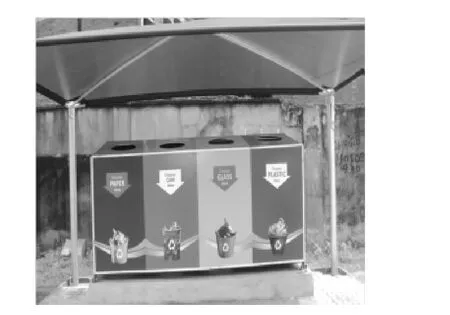
Fig.2 Recycling bank
The informal recycling programs involve scavengers'effort search of recyclable items[15].Presently,the informal sector renders the service of retrieving and recycling of materials in Nigeria.The introduction of an advance formal recycling program presents positive and accelerating outcomes for municipal'waste treatment sector[16].
4.6 Disposal
The table 1 shows the various waste disposal practices in Kano metropolis.More than two-third of the residents do not use authorized dumpsite for their waste.According to the state agency responsible for waste management-refuse management and sanitation board(REMASAB),solid waste in Kano metropolis is to be dumped by the public at designated collection areas[17].
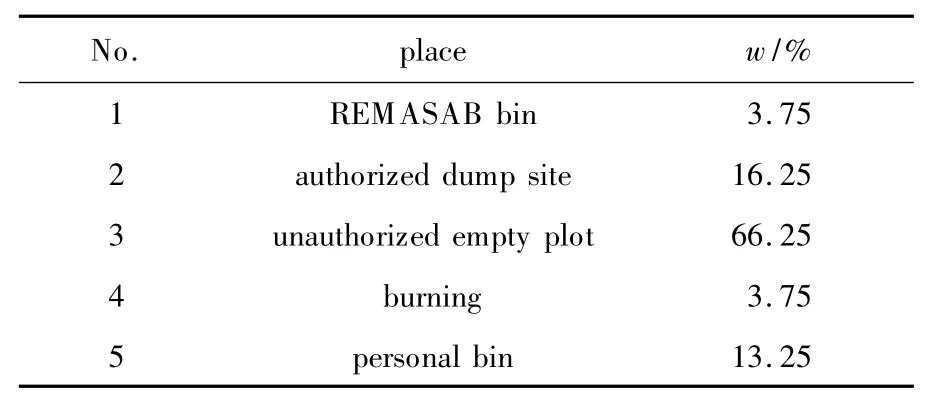
Table 1 Disposal method by residents
The landfill disposal technique of waste materials with dearth of treatment processes and open dumping possesses increasing public health hazards to human lives,animals and plants.However,the evolutions of poisonous gases such as methane and carbon-dioxide causes alteration of weather,leading to climate change(Fig.3).
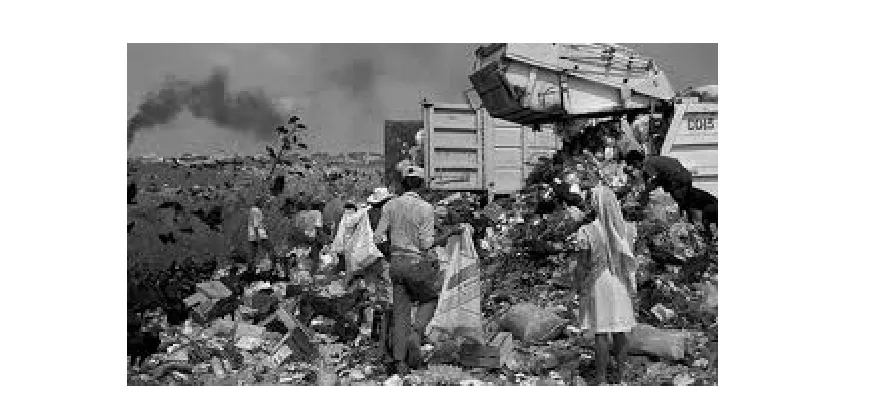
Fig.3 Waste disposal unit at Lagos
4.7 Waste Generation
There are varied data on waste generation and composition due to poor information management but notable of use is the study carried out by TC Ogwueleke in 2013 in some cities as shown Table 2[18].

Table 2 Varied data on waste generation and composition in 2013 in cities
Presently,the rate of waste generation in Lagos(with estimated population over 15 million in 2013)is 12 000 t/d(Lagos State Waste Management Authority,LAWMA),while in Kano State,the rate is 7 849 t/d(Bayero University Kano Consultancy Unit).Generally,the average rate of generation is estimated as 0.5 kg/capital/day.Biodegradable waste account for over 50%of waste generated with other component estimated at different composition in different States.A recent study carried by the Bayero University Kano Consultancy Unit(March,2012)estimated the following composition for w(polythene/cellophane)=19%,w(paper)=12.7%,w(metal)=10%,w(glass)=8.7%,w(plastics)=11.3%,w(fines(ash,dust and sand))=12%,w(miscellaneous)=9%,while a study by the Basel Convention Coordinating Centre for Africa in 2013 reveals that 70%of all imports were used electronic electrical equipment of which about 30%could be described as e-waste.
It can be seen,from Table 3 that,of the MSW,69.3%is of organic compounds.Mattocks explained that a digester must be designed on the basis of the amount of refuse that is collected and fed to the digester,not on the quantity of waste produced.
Generally,all waste streams are stored together in either bags or containers(such as used buckets)and plastics waste bins.LAWMA provides 240 L bins for households after annual payment of the Land Use charge through the Land Records Company.
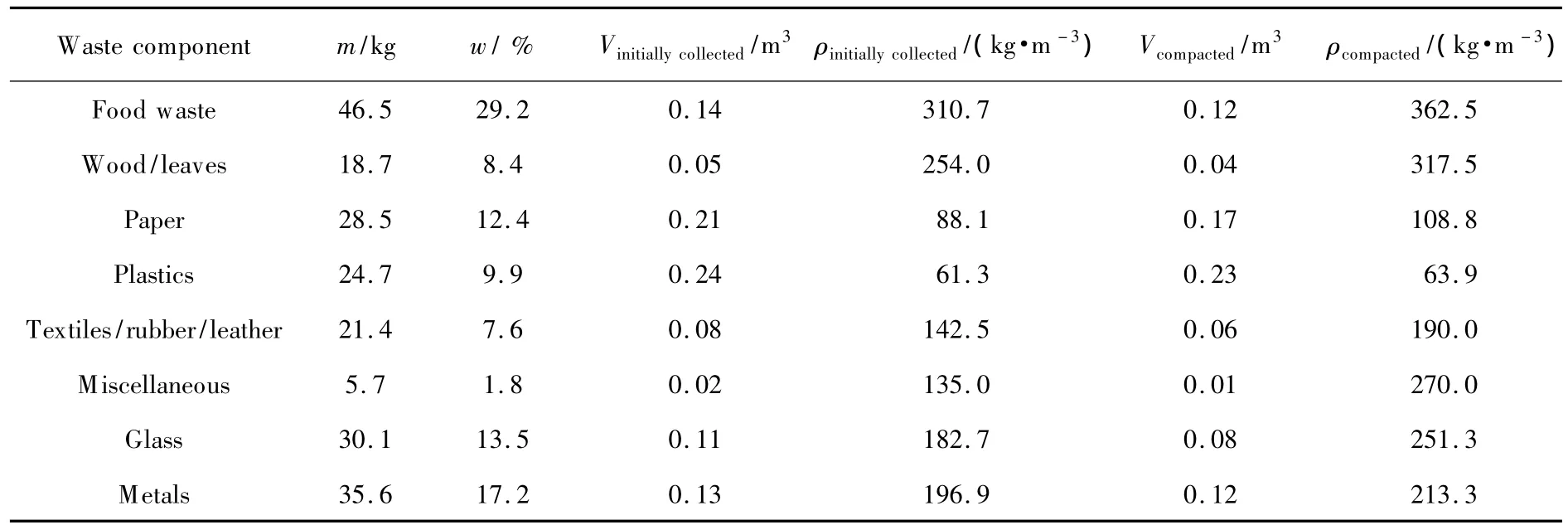
Table 3 Physical composition of MSW in Nigeria
4.8 Waste to Energy Projects
Based on the findings,the following projects have been proffered:
(1)Solid waste management should be provided in the yearly budget with a separate head for the purpose of adequate revenue allocation,implementation and monitoring.
(2)There is need to enhance environmental education programs and public participation as it affects solid waste management not only through the radio,television and print media but also through grassroots enlightenment campaigns via the chiefs,community leaders.
(3)Effective solid waste management requires the involvement,participation and cooperation of local communities and the government.
(4)Public private partnership is highly encouraged in solid waste and environmental management.
(5)Government should commit itself to sponsoring more research projects into the reduction of solid waste at source,collection and efficient disposal(Fig.4,Fig.5).

Fig.4 Landfill gas collection
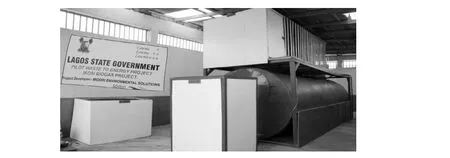
Fig.5 Biogas project
5 Conclusions
The survey research methods adopted.Data collected through questionnaire were analyzed and hypotheses tested using Z-test statistical measure.The scientific investigation revealed among other things that resources normally voted by government year to manage solid waste is always very important.Based on the findings,some of the major recommendations are that,solid waste management should be provided with a separate head in the budget for the purpose of adequate revenue al-location,implementation and monitoring.The participation of the local communities in solid waste management should be encouraged.Environmental education should be intensified by both the state and local government.
There is need for the Government to put more pressure on the issue so that waste can become wealth in abundance.A degraded environment cannot sustain a continued growth and it impacts negatively on the entire development of a nation.Waste needs proper treatment in other to have pollution free environment.
[1] Adegbite E,Amaeshi K,Nakajima C.Multiple Influences on Corporate Governance Practice in Nigeria:Agents,Strategies and Implications[J].International Business Review,2013,22(3):524-538.
[2] Afon A O.Informal Sector Initiative in the Primary Sub-system of Urban Solid Waste Management in Lagos,Nigeria[J].Habitat International,2007,31(2):193-204.
[3] Arukwe A,Eggen T,Moder M.Solid Waste Deposits as a Significant Source of Contaminants of Emerging Concern to the Aquatic and Terrestrial Environments—A Developing Country Case Study from Owerri,Nigeria[J].The Science of the Total Environment,2012,438:94-102.
[4] Bernstad A,la Cour Jansen J.Separate Collection of Household Food Waste for Anaerobic Degradation—Comparison of Different Techniques from a Systems Perspective[J].Waste Management,2012,32(5):806-815.
[5] Chokor B A.Perception and Response to the Challenge of Poverty and Environmental Resource Degradation in Rural Nigeria:Case Study from the Niger Delta[J].Journal of Environmental Psychology,2004,24(3):305-318.
[6] Coker A,Sangodoyin A,Sridhar M,et al.Medical Waste Management in Ibadan,Nigeria:Obstacles and Prospects[J].Waste Management,2009,29(2):804-811.
[7] Ezeah C,Roberts C L.Analysis of Barriers and Success Factors Affecting the Adoption of SustainableManagement of Municipal Solid Waste in Nigeria[J].Journal of Environmental Management,2012,103:9-14.
[8] Igoni A H,Ayotamuno M J,Ogaji S O T,et al.Municipal Solid-waste in Port Harcourt,Nigeria[J].Applied Energy,2007,84(6):664-670.
[9] Ikediashi D I,Ogunlana S O,Oladokun M G,et al.Assessing the Level of Commitment and Barriers to Sustainable Facilities Management Practice:A Case of Nigeria[J].International Journal of Sustainable Built Environment,2013,1(2):167-176.
[10] Imam A,Mohammed B,Wilson D C,et al.Solid Waste Management in Abuja,Nigeria[J].Waste Management,2008,28(2):468-472.
[11] Nnorom I C,OsibanjoO.Electronic Waste(ewaste):Material Flows and Management Practices in Nigeria[J].Waste Management,2008,28(8):1472-1479.
[12] Nzeadibe T C.Solid Waste Reforms and Informal Recycling in Enugu Urban Area,Nigeria[J].Habitat International,2009,33(1):93-99.
[13] Nzeadibe T C,Anyadike R N C.Social Participation in City Governance and Urban Livelihoods:Constraints to the Informal Recycling Economy in Aba,Nigeria[J].City,Culture and Society,2012,3(4):313-325.
[14] Odunjo,Omolola O.Why Nigeria is Not Yet Sustainably Developed[J].APCBEE Procedia,2013,5:383-387.
[15] Ofori-Boateng C,Lee K T,Mensah M.The Prospects of Electricity Generation from Municipal Solid Waste(MSW)in Ghana:A Better Waste Management Option[J].Fuel Processing Technology,2013,110:94-102.
[16] Ogbazi J U.Alternative Planning Approaches and the Sustainable Cities Programme in Nigeria[J].Habitat International,2013,40:109-118.
[17] Oguntoyinbo O O.InformalWaste Management System in Nigeria and Barriers to an Inclusive Modern Waste Management System:A Review[J].Public health,2012,126(5):441-447.
[18] Ogwueleka T C.Survey of Household Waste Composition and Quantities in Abuja,Nigeria[J].Resources,Conservation and Recycling,2013,77:52-60.

